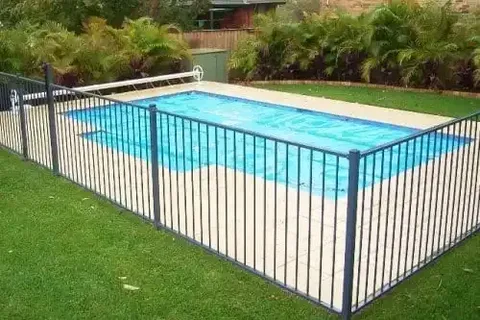Glass vs. Aluminum Pool Fencing: Which Is Better?
When it comes to pool safety and aesthetics, choosing the right fencing material is just as important as the pool design itself. Two of the most popular options on the market today are glass and aluminum pool fencing. Each offers distinct advantages and potential drawbacks. So, glass vs. aluminum pool fence: which is better? Let’s explore the pros and cons of both to help you make an informed decision.
Aesthetic Appeal
Glass Pool Fencing
Glass pool fencing is the go-to choice for homeowners seeking a sleek, modern look. It offers unobstructed views of your pool area, which enhances the visual appeal of your backyard and creates a sense of openness. Frameless or semi-frameless designs can make smaller spaces look larger and more luxurious.
Aluminum Pool Fencing
Aluminum fencing, on the other hand, brings a more traditional and structured appearance. Available in various colors and designs, it can complement both modern and classic home styles. While it doesn’t offer the same visibility as glass, its narrow pickets still allow for decent views of the pool.
Durability and Maintenance
Glass Pool Fencing
Glass is surprisingly strong, especially when tempered safety glass is used. It’s resistant to rust and corrosion, making it an excellent choice for areas with high humidity or near saltwater pools. However, it does require frequent cleaning to remove water spots, fingerprints, and grime.
Aluminum Pool Fencing
Aluminum is known for its strength and low maintenance. It’s rust-resistant and can withstand harsh weather conditions without deteriorating. Unlike glass, aluminum fences don’t require regular cleaning and are less prone to showing dirt or smudges.
Safety and Security
Glass Pool Fencing
Glass fencing provides a solid barrier that children and pets cannot easily climb. Most glass panels come with childproof locking gates, making them a safe option. The transparency also allows you to monitor pool activity easily from any angle.
Aluminum Pool Fencing
Aluminum fencing is equally safe, particularly when built to meet pool safety regulations. However, the vertical bars may be climbable depending on their spacing, so it’s important to choose a design that complies with local safety standards.
Cost Considerations
When comparing glass vs. aluminum pool fencing: which is better from a cost perspective, aluminum is usually the more budget-friendly option. Glass fencing tends to be more expensive, not just in material cost but also in installation and maintenance. However, many homeowners view it as a long-term investment that adds value to the property.
Installation and Flexibility
Glass fencing often requires professional installation due to its weight and precision requirements. In contrast, aluminum fencing is generally easier and faster to install, and some DIY-savvy homeowners even choose to tackle the job themselves.
Final Verdict: Glass vs. Aluminum Pool Fencing – Which Is Better?
So, glass vs. aluminum pool fencing: which is better? The answer ultimately depends on your priorities:
- Choose glass if you value modern aesthetics, unobstructed views, and are willing to invest more in both cost and maintenance.
- Opt for aluminum if you prefer a cost-effective, low-maintenance solution with strong durability and classic appeal.
Both materials are excellent in their own right. The right choice for you will depend on your budget, design preference, and maintenance expectations.
Glass vs. aluminum pool fencing: which is better? Now that you know the key differences, you’re better equipped to make a smart and stylish choice for your pool area.


